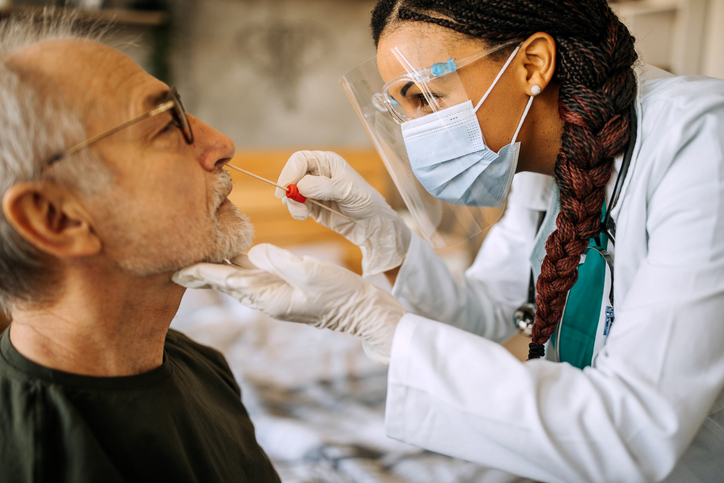Inspira Health CEO Amy Mansue tours Primary Care office, chats with Dr. Kristen Trom about annual...
Read More

After more than two years of masks, social distancing and travel restrictions, this winter is likely to be much different. Experts are anticipating an uptick in COVID cases this year during flu season, which has gotten off to an early start. These factors, combined with a spike in respiratory syncytial virus (RSV) cases, have many infectious disease experts bracing for a ‘tripledemic’ this winter.
Understanding these illnesses and recognizing their symptoms can help ensure you and your family take the necessary precautions to stay safe this winter.
“As the weather cools down and we start spending more time indoors, many infectious disease experts expect COVID cases to spike before the holidays,” said Evelyn Balogun, M.D., medical director of Inspira Medical Group. “Factors such loosening of social behaviors adopted in the initial pandemic response and the possibility of emerging variants increase the likelihood of more cases as we head into the winter months.”
In addition to COVID concerns, the Centers for Disease Control and Prevention (CDC) reports that the flu season has gotten an early start. Seasonal flu activity has been reported across most of the country, with the highest case numbers coming from the southeastern and south-central United States, followed by the Mid-Atlantic and the south-central West Coast regions.
This year is also seeing an early spike in RSV cases. RSV is a common, contagious respiratory virus that usually spreads throughout the winter, but this year, it started spreading earlier, leading to increased rates of infection and hospitalization. While RSV is a virus known to cause respiratory illness in children and adults, we have seen a particular surge of pediatric cases this season with a higher than usual rate of serious illness and hospitalization.
The combined risks of COVID, the flu, and RSV have public health officials, hospitals and emergency departments bracing for a difficult winter, especially for people at increased risk for severe illness and hospitalization.
“People at increased risk for the flu and COVID include adults 65 years and older, pregnant people and those who are immunocompromised,” said Dr. Balogun. “Older adults, young children and infants are most at risk for RSV.” Although most people with RSV can stay home to recover, some cases may require medical attention.
Symptoms of COVID, the flu and RSV can overlap and may include:
“In most cases of COVID, the flu and RSV, symptoms are likely to be mild,” said Dr. Balogun. “However, since they all affect the respiratory system, they can result in breathing difficulties.” If you or your child is struggling to breathe or speak clearly, seek medical care immediately.
Since symptoms of COVID, the flu and RSV are similar, getting tested is the only way to receive an accurate diagnosis. While at home tests offer a convenient and quick access to testing, be mindful that serial testing may be necessary to increase the accuracy of the test. Current FDA guidance also recommends repeat testing within 48 hours following an initial negative home test. If your symptoms continue, schedule an appointment with your doctor to discuss your next steps.
The COVID and flu vaccines offer the best protection against severe cases. The Food and Drug Administration (FDA) has also authorized COVID boosters targeting the Omicron variant BA.5 for people ages five and older.
There isn’t an RSV vaccine yet, but there are candidates in late-stage clinical trials. Pfizer is also developing an antiviral treatment to combat RSV symptoms.
If you or someone in your family is at increased risk for COVID, the flu or RSV, you can help prevent illness by staying up-to-date with vaccinations and wearing a mask in crowded indoor spaces. Wash your hands often with soap and water and keep your hands away from your face to avoid spreading germs. Minimize close contact with others who are sick, and stay home if you’re experiencing flu-like or cold-like symptoms.
Schedule an appointment with your doctor for more information on COVID, the flu or RSV.
Inspira Health is a high reliability organization (HRO), which means safety is the top priority for patients and staff. To make an appointment, call 1-800-INSPIRA.

Inspira Health CEO Amy Mansue tours Primary Care office, chats with Dr. Kristen Trom about annual...
Read More
Hangovers result from dehydration, disrupted sleep, inflammation and the byproducts of alcohol...
Read More
Scheduling a back‑to‑school immunization visit ensures your child meets school requirements and...
Read More